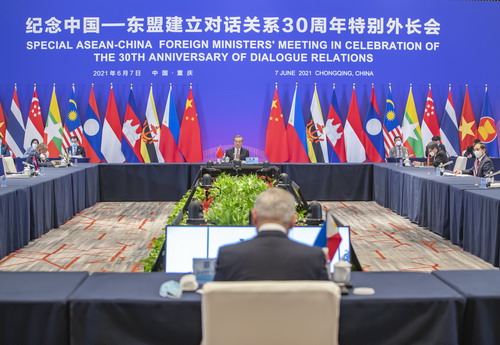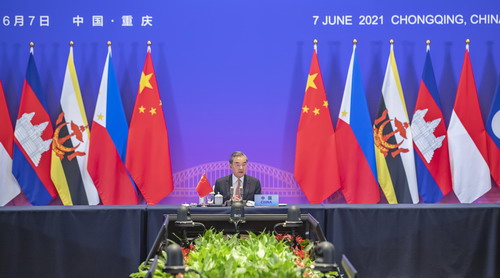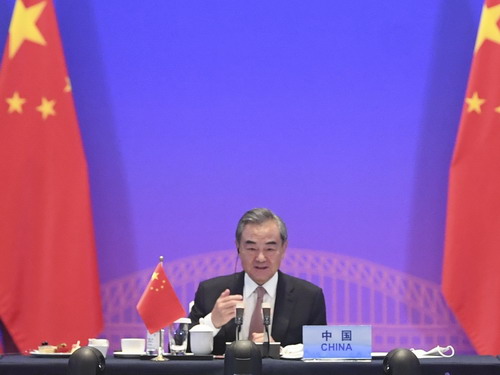| Wang Yi Attends Special ASEAN-China Foreign Ministers' Meeting in Celebration of the 30th Anniversary of Dialogue Relations |
| 2021-06-07 15:23 |
|
On June 7, 2021, the Special ASEAN-China Foreign Ministers' Meeting in Celebration of the 30th Anniversary of Dialogue Relations was held in Chongqing. State Councilor and Foreign Minister Wang Yi and Teodoro Locsin, Foreign Secretary of the Philippines that serves as the current country coordinator for ASEAN-China relations, co-chaired the meeting. Other foreign ministers of the ASEAN countries and ASEAN Secretary-General were present. Wang Yi said, over the past 30 years, China-ASEAN relations have developed by leaps and bounds, releasing vigorous vitality and covering a broad area. The two sides have pursued harmony and win-win cooperation, built an important pillar for regional peace and stability, forged a powerful engine for development and prosperity, and established the most successful example of Asia-Pacific regional cooperation. Both sides have delivered enormous benefits to two billion of people across 11 countries. At this moment of building on past successes to further advance bilateral relations, both sides should carefully review the development of bilateral relations, apply the successful practices of giving priority to development, enhancing mutual trust, focusing on cooperation, and properly handling differences, and elevate the cooperation to a higher level. The two sides should reinforce ASEAN centrality, and maintain an open and inclusive regional framework, creating a more favorable environment for respective development and the lasting peace and prosperity of the entire region. Wang Yi expressed, over the past three decades, China and the ASEAN have worked together to enrich the strategic partnership, and deliver fruit results in political security, economy and trade, and social and people-to-people exchanges. The two sides have established dialogue mechanisms at various levels between leaders, ministers and senior officials to conduct timely strategic communication on major issues, thus laying a solid foundation for the development of relations. Trade volume between China and ASEAN jumped from less than 8 billion U.S. dollars to 684.6 billion U.S. dollars, an increase of more than 80 times. The personnel exchanges exceeded 65 million in 2019, and there were nearly 4,500 flights between China and Southeast Asia every week. Meanwhile, the two sides have exchanged more than 200,000 students and formed more than 200 pairs of sister cities.
Wang emphasized, over the past 30 years, the two sides have become the largest trading partners, the most connotative cooperation partners and the most dynamic strategic partners through joint efforts. These hard-won achievements and valuable experience deserve to be cherished and carried forward. These achievements are mainly attributable to the following factors: First, make bilateral relations a priority in each other's diplomatic agenda. Building friendship and partnership with its neighbors is the fine tradition of Chinese diplomacy. The fast growth of China-ASEAN relations also promotes the investment of other major forces in the ASEAN, which raises the status of the ASEAN in the world, strengthens solidarity and cooperation, and expands the global influence of the East Asia. Second, put people first and focus on practical cooperation. Both sides always put the interests of the two peoples as top priority, and advance all-round practical cooperation in all fields. Thanks to the synergy of the Belt and Road Initiative and the Master Plan on ASEAN Connectivity (MPAC) 2025 between China and ASEAN, a large number of projects are being implemented, bringing tangible benefits to the people. Third, uphold the spirit of partnership, and jointly tackle major challenges. True friendship reveals itself in time of trouble. Both sides overcome difficulties with concerted efforts. We jointly defeated sudden crises, such as two financial crises, the Indian Ocean tsunami, and SARS, demonstrating the true brotherhood and neighborhood with concrete actions. In particular, in the fight against the COVID-19, we assisted each other and offered encouragement, deepening friendship, trust and shared interests. Fourth, adhere to open development and seek mutual benefits and win-win results. Both sides have set up the largest free trade area for developing countries in the world, built the regional production base that can compete with the ones in North America and Europe, and created the miracle of East Asian prosperity. Both sides have accelerated East Asia economic integration and signed Regional Comprehensive Economic Partnership (RCEP), serving as leading drivers for maintaining free trade, multilateralism, and international cooperation. Fifth, give top priority to the overall situation and properly handle differences. It's natural for neighbors to have disagreements. Both sides should, on the basis of mutual respect, set up coordination and dialogue mechanisms at different levels, and properly handle and manage differences through consultation, sticking to the general direction of friendship and cooperation. Both sides should actively expand the cooperation fields of bilateral ties, make the cake of cooperation bigger, enabling us to rise above differences and seek mutually beneficial results. We should effectively implement the Declaration on the Conduct of Parties in the South China Sea (DOC), advance consultations on the Code of Conduct in the South China Sea (COC), proving that the two sides are able to translate differences into areas of cooperation, and reflecting the shared aspiration of preserving regional peace and stability.
Wang Yi said, this year marks the centenary of the founding of the Communist Party of China (CPC) and China will begin a new journey toward fully building a modern socialist country under the leadership of the CPC Central Committee with Xi Jinping at the core. While fostering a new development paradigm, China will provide a vaster market, more opportunities and stronger drivers for ASEAN and other countries. Entering into a new historical period, China and ASEAN should focus on the next 30 years to jointly realize, maintain, and develop a road of regional cooperation with East Asian characteristics, build a higher level of China-ASEAN strategic partnership, and build a closer community with a shared future. To this end, China wishes to propose the following: First, deepen anti-pandemic cooperation. China will continue to play its role as a responsible major country to do its best to provide vaccines to ASEAN countries, and strengthen cooperation in vaccine R&D, production, procurement, vaccination, and supervision with other countries. It will implement the China-ASEAN Public Health Cooperation Initiative, support ASEAN Regional Reserve of Medical Supplies for Public Health Emergencies, and advance the building APT reserve of essential medical supplies, thus improving the capability of regional public health. Second, push forward economic recovery. Focusing on ASEAN Comprehensive Recovery Framework, China and ASEAN should create a new high landscape and new situation for China-ASEAN cooperation after the pandemic. Both sides should formulate the Action Plan for Digital Economy Cooperation, explore and reach the China-ASEAN Digital Security Initiative, and advance technological innovation. Both sides should ensure the success of the China-ASEAN Year of Sustainable Development Cooperation, and promote low-carbon economic transformation. The two sides should carry out cooperation on the blue economy and create cooperation highlights in fishery resource conservation, marine environmental protection, and maritime disaster prevention and mitigation. Third, upgrade bilateral relations. Both sides should enhance strategic communication of the top leaders, and strengthen political guidance for bilateral relations. We should discuss how to elevate the China-ASEAN relations into the comprehensive strategic partners, setting a new example for China-ASEAN cooperation. Fourth, reach the COC at an early date. China is willing to work with directly concerned parties of the South China Sea to increase dialogue and consultation, properly manage differences, and continuously enhance mutual trust. We should jointly maintain stability in the South China Sea, and avoid unilateral actions that may escalate the tensions and worsen the situation. At the meeting, both sides agree to restart the COC consultations, and continue with the full and effective implementation of the DOC, showcasing to the world that we have the confidence, capability and wisdom to maintain regional peace and stability. Fifth, uphold multilateralism. Both sides should observe the purposes and principles of the UN Charter, uphold the UN-centered international system and the international order based on international law, defend the legitimate rights and interests of developing countries, and promote democracy in international relations. The ASEAN-centered regional cooperation framework accords with the East Asian tradition and real needs, and this framework should be cherished and strengthened as it is more mature and stable. Based on East Asia, both sides should expand exchanges and cooperation with other regions. Sixth, jointly carry forward Asian values. Taking root in the Oriental tradition, both sides should strengthen mutual learning and cultural exchanges, and carry forward Asian values, instilling positive energy to global and regional governance. Both sides should continue to embrace the "Asian Way" of consensus building and accommodating each other's comfort levels, build an inclusive and co-existed family, and forge a cooperation circle featuring common development. We should adhere to independence, self-reliance and self-strengthening to support the ASEAN integration, and forge a closer community with a shared future. Wang Yi stressed, China stands ready to work with ASEAN countries to strengthen solidarity and cooperation, stay true to shared ideals and blaze a new trail. We should implement leaders' important consensus, and elevate China-ASEAN relations to a new height, opening up another 30 years of even greater cooperation. Foreign ministers of ASEAN countries extended congratulations on the 100th anniversary of the founding of the CPC, fully affirmed fruitful results achieved since ASEAN and China have established dialogue relations over the past 30 years. They appreciated China's support and assistance for ASEAN integration and connectivity. They expressed, ASEAN-China relations are the most important and fruitful relations, and have become an important pillar for regional peace, stability, development and prosperity. ASEAN countries are willing to work with China to implement the ASEAN-China Strategic Partnership Vision 2030 and the Plan of Action to Implement the Joint Declaration on ASEAN-China Strategic Partnership for Peace and Prosperity (2021-2025). They will seek greater synergy of development strategies to elevate the bilateral relations to a higher level. Both sides should beef up cooperation and capacity-building in such areas as pandemic response, economic recovery, connectivity, disaster relief and prevention, sustainable development, and digital transformation, advance regional economic integration, maintain the momentum of COC consultations, and jointly maintain peace and stability in the South China Sea and promote regional common development and prosperity.
|
| |||||||||||||||
|
|||||||||||||||





